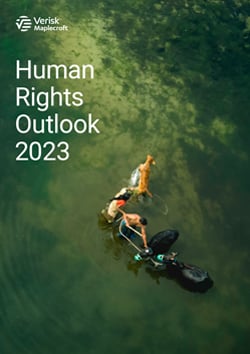Human rights deteriorating across largest emerging market bond issuers
Human Rights Outlook 2023
by James Lockhart Smith,
Think about the S in emerging and frontier market sovereign ESG in 2023, and a host of external economic and geopolitical risk drivers probably come to mind. But our Sovereign ESG Ratings reveal that human rights are deteriorating across a swathe of middle-income countries, including several key government debt portfolio constituents that investors are going to have to watch closely. The emerging market heavyweights of Brazil, Colombia, Indonesia, Malaysia, Mexico, Peru, the Philippines and South Africa all fall into this category.
The human rights indicators from the Ratings offer a window into exactly what has gone wrong. Tighter economic conditions and a lack of political bandwidth have seen human rights put on the backburner. This is significant, as worsening human rights can be an early warning sign for widening risks in the future, including instability. But in the immediate term, it provides sovereign investors with a clear opportunity to press governments on policy areas that have unravelled and bring human rights back up the agenda as part of their ESG incorporation strategies.
Recent drop in middle-income human rights protections may have further to run
As shown in Figure 1, human rights have taken a hit across the middle of the income spectrum since the decade began. Rights protections were already weak in the very poorest countries. The developed world has mostly proved resilient. But in many countries in the middle – including those issuers that make up the investable emerging and frontier market universe – institutions have become less effective and violations are becoming more severe and widespread.
The analytics underpinning our Sovereign ESG Ratings suggest this could be more than a post-pandemic blip. Many countries whose social risk profile has declined since 2020 are close to tipping points that would see them downgraded from ‘Moderate’ to ‘Weak’ performers in the Ratings’ human rights category. And should countries cross these thresholds, our previous research suggests it could be material for the market pricing of their bonds.
Figure 2 spotlights 10 emerging markets for investors to watch this year that are both heavily traded and relatively close to tipping points between clusters (see feature box at end).
These countries’ human rights profiles started the decade badly and have largely worsened since. China was already firmly in the Weak cluster and looks to be going nowhere but backward. Turkey has improved somewhat, though only from a similarly low base, while Malaysia is flatlining in the middle of the pack. The other seven are all en route from the Moderate to Weak cluster – an extraordinary situation for a group of major middleincome democracies.
Human rights taking second place to economic and political instability
Digging into the underlying data shows that a range of issues are driving deteriorations in their performance, but a unifying trend is that the institutions and processes protecting human rights are becoming weaker. As expected, where government spending or attention on protecting rights has decreased, violations during the 2020-2023 period have become more severe and frequent. Key examples include Brazil, Mexico, the Philippines, Indonesia and Colombia where rollbacks on freedom of assembly have occurred, and with South Africa and Colombia on human rights abuses committed by security forces.
While the current economic situation is partly to blame, the attention issuers pay to human and labour rights, and the steps they take to protect them, are equally a matter of bandwidth and political will. In essence, fighting domestic fires on the home front means action on human rights has stalled.
Worryingly, this means violations still have plenty of room to get worse as citizens bear the costs of their governments’ recent backpedalling. Political and economic instability may also translate into further deterioration in these sovereigns’ human rights profiles as governments resort to security force violence to clamp down on unrest driven by the cost-of-living crisis and political polarisation. Recent events in Peru serve as a stark warning.
Sovereign ESG investors should engage on implementation
The short-term outlook for human rights in these countries is unfortunately challenging. But if a mix of political and economic crises is to blame, rather than a coordinated strategy to deliberately roll back rights guarantees, then there is plenty for sovereign investors to work with.
Despite Beijing’s increasing global influence, Western capital remains important – even more so now in a context of tighter financing conditions and mounting debt distress. Investors may therefore be able to make headway this year by being very clear about what they are looking for in terms of policy action, including where recommendations become conditions attached to specific transactions.
While investors should be frank about violations when engaging with governments, driving implementation of processes in key institutions to facilitate change should be a key area of focus. Our Sovereign ESG Ratings and their underlying human rights risk data show these are exactly the aspects that have recently begun to fray. If they remain unchecked the risks could become material.




